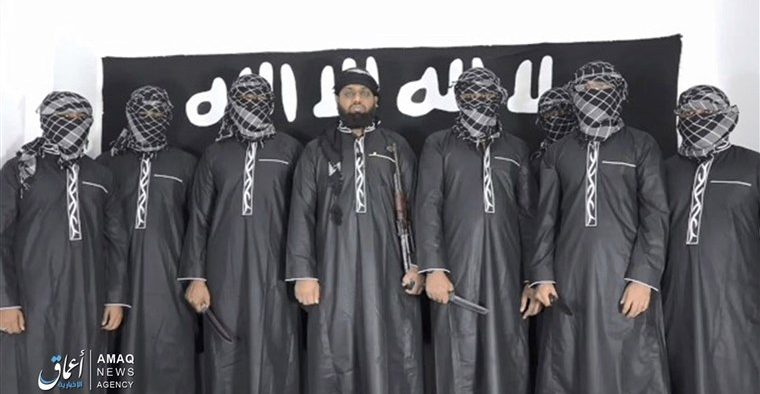Sri Lanka Attack Shows Defeating ISIS Only Makes it More Dangerous

Taking out a terrorist group’s leaders or conquering its physical territory “is not the same as undermining its ideology or destroying its raison d’être.”
Indian intelligence services warned Sri Lankan officials about a suspect in last Sunday’s Easter bombings in the days and weeks leading up to the attack.
India’s information came from interrogations with an arrested ISIS suspect, who tipped off investigators with the name of a man he had trained, and who is now connected to the Sri Lankan terrorist group implicated in the bombings.
The man, Zahran Hashim, was shown in a video of the alleged suicide bombers released by ISIS on Tuesday. The same day, the terrorist organization claimed responsibility for the massacre.
ISIS’ involvement explains how an obscure extremist group, the National Thowheed Jamath (NTJ), could execute one of the most sophisticated and destructive terrorist attacks in history. As of Thursday, the Easter Sunday bombings have killed over 250 people and injured hundreds more.
ISIS: As it Weakens, Becomes More Dangerous
The terrorist attack comes a month after the Islamic State caliphate was eradicated from Syria and Iraq and four months after President Donald Trump declared the group defeated.
Counterterrorism experts anticipated ISIS would continue its mission, however, as Charlie Winter tweeted, “as its core weakens, its peripheries will become more dangerous.”
Al Qaeda was forced out of Afghanistan in 2002, but survived by setting up proxies in northern Africa and Yemen. ISIS’ amorphous nature is even more dangerous than Al Qaeda’s, because the group has a powerful international media network and plentiful affiliate groups around the world.
Bruce Hoffman, a counterterrorism specialist at Georgetown University, told the New Yorker’s Robin Wright that taking out a terrorist group’s leaders or conquering the physical territory that it controls “is not the same as undermining its ideology or destroying its raison d’être. Revenge and retaliation arguably infused isis with newfound purpose and energy.”
ISIS Network Grows
According to the UN, the Islamic State has $50 to $300 million in cash hidden in Iraq, Syria and other neighboring countries. The terrorist group’s media network operates in multiple languages with a global team of editors and writers, and fighters communicate directly through encrypted apps.
Last week, Iraqi officials announced they had taken out one of ISIS’ media headquarters in a remote hide-out. The Islamic State office was responsible for producing the group’s weekly newsletter, Naba. But since ISIS has writers scattered throughout the world, Naba was still published on schedule the following week.
While intelligence experts remain unsure of the extent the Islamic State was involved in the Sri Lanka suicide bombings, ISIS’ reposted video of the attackers pledging allegiance to the group implies a close line of communication.
Sri Lankan intelligence services have historically focused on the separatist militant group Tamil Tigers, which is predominantly Hindu. Islamist extremists had a low profile in Sri Lanka before Sunday, and whoever planned the attack likely recognized this unique blind spot.
“When combined with ISIS’ technical know-how and expertise, the combination with the local knowledge of more parochial groups can have devastating effects,” global security expert Colin P. Clarke told the New York Times.
Some analysts, such as Foreign Policy’s Neil Devotta, believe the attack’s focus on Christians is evidence of foreign influence. Extremist Buddhists have committed violence against Sri Lanka’s Muslims, not Christians. If the attack was an act of retaliation, it would make far more sense if it were against Buddhists. Devotta believes ISIS influenced the suicide bombers to terrorize Christians, in order to incite hatred and violence against the island’s Muslims – and potentially radicalize them.
ISIS has always dreamed of becoming a global caliphate, and as it lends its brand to sectarian conflicts throughout the world, the international community must cooperate to confront its newest manifestation.















